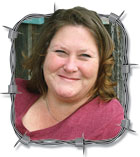 If you think there is no future in farming, check out the pages of this edition of Ozarks Farm & Neighbor and you might just change your mind.
If you think there is no future in farming, check out the pages of this edition of Ozarks Farm & Neighbor and you might just change your mind.
The Ozarks are blessed with some of the brightest stars in the future of agriculture, so our industry is in good hands. These young people are examples of great future agriculture leaders and I am so proud we have the opportunity to highlight them and their accomplishments. I look forward to seeing what the future holds for them.
Today’s youth have a multitude of agriculture-related career choices, and even young people who have never stepped foot on a farm are looking to a future in agriculture. At a recent meeting of my FFA alumni group, we learned that only about 20 percent of the students enrolled in agriculture education at my old high school actually live on farms. Hopefully, that means there is a growing number of young people who want to be involved in agriculture, but have not had the opportunity until they reached high school to cultivate that desire.
I went to college with a guy who grew up in a Springfield, Mo., suburb. I always joked that he was a redneck at heart, but he was trapped in the city limits. He had never been involved in FFA, I don’t even know if his high school had it, and I don’t think he was in 4-H. He had never been around any livestock, hauled hay or any of the others things most of us had grown up doing, but he loved the soil and making things grow. We had an upper-level soils class together at Missouri State and it was a booger, but he helped explain a few things to me and I helped him with a couple of livestock question. All these years later, he’s running a co-op somewhere out west and is raising kids, both goat and human.
It just goes to show that people involved in agriculture are as diverse as the industry.
One of my former ag teachers, Terry Halleran, always said there was more to agriculture than “cows and plows.” As a teenager in a small, rural community, I really didn’t see anything other than cows and plows, but as I got older I saw there really was much more to it. Yes, Mr. Halleran, I said you were right. Yes, I should have paid a little more attention in your class, but your words have never left me.
There is a growing field of jobs in the industry, but the backbone of agriculture will still be those who tend livestock and grow crops.
A growing number of young people are determined to stay in the family business than in generations past. I often talk to young people who hope to take over the family farm one day, just like their parent took over from their parents. They know it’s going to be hard to make a living and they know they will likely have to get a “town job” at some point, but they are dedicated to their craft.
These are the young people who will continue to be at the heart of production agriculture. There are also new, first-generation farmers finding their path to production agriculture. It might be with a small chicken coop in their backyard, but it’s a path.
No matter what agricultural endeavor today’s youth and/or new farmers decide upon, it’s up to my generation and those who came before me to encourage them to follow their dreams and offer advice when asked. Without encouragement from others, dreams can quickly become dimmed and will eventually fade away. Can we afford to gamble with the future of agriculture?
I for one believe in the future of our youth, and the future of farming.
Julie Turner-Crawford is a native of Dallas County, Mo., where she grew up on her family’s farm. She is a graduate of Missouri State University. To contact Julie, call 1-866-532-1960 or by email at [email protected].





